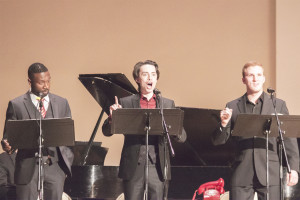Satire is, at its core, a means by which truth is communicated. Humor and exaggeration are used to highlight the facts of a situation, and in doing so, help an audience to understand them. Satire draws attention to the facts by presenting them with absurdity – but what do you do when you are satirizing a situation for which the facts are already profoundly absurd?
Rodman in North Korea, composed by Houghton’s Sarah Hutchings, professor of composition and theory, was presented last Saturday evening in Wesley Chapel. Most of the musicians involved were Houghton students, however, two outside professionals were hired for the two leading roles. Carl DuPont, bass-baritone, portrayed the iconic and somewhat inebriated basketball player Dennis Rodman, and Ray Chenez, counter-tenor, took the stage as the Supreme Leader himself, Kim Jong-Un. The principle cast was filled out by Houghton junior Tim McGowan, playing the supporting role of Kim-Jong Un’s assistant, Kim Won-hong.
 “I would be lying if I said that it was not intimidating,” McGowan said, “However, it was a huge honor to sing with Chenez and DuPont. The two guest artists were very kind and professional. I was able to ask them so many things about the life of a professional opera singer which truly is what makes having guest artists so valuable to aspiring student-singers like myself.”
“I would be lying if I said that it was not intimidating,” McGowan said, “However, it was a huge honor to sing with Chenez and DuPont. The two guest artists were very kind and professional. I was able to ask them so many things about the life of a professional opera singer which truly is what makes having guest artists so valuable to aspiring student-singers like myself.”
The reality of the North Korean situation has been brought to us through numerous media over the last several years, including news coverage, and more recently in the movie The Interview. But what does the less-familiar medium of opera bring to the table when it comes to describing a situation? “There is another plane by which we can access expression and emotion when using opera,” said Hutchings. “The combination of vocal athleticism and drama that we find in opera can be very compelling when paired with the right story…A common assumption is that opera will always be dark and serious. In Rodman in North Korea, we have elements of “dark” when referring to the suffering of the Korean people, however, we bring levity to the characters and in the music to tell one of the most unusual stories in modern times.”
The libretto, or the text of the opera, written by Mark Sonnenblick, and Hutching’s score worked together to convey the seriousness, as well as the absurdity, of the situation. The opera opens with a rallying chorus of the Korean people singing to the tune of a corny melody about how “all the world loves our Marshall,” something that we as the audience know to be a lie that has been fed to them by propaganda. Kim Jong Un cares more about whether his phone is plugged in correctly (to receive a phone call from Obama, no less) than the plight of his people. When the government runs out of chicken for a banquet, the chorus solidly cadences on the statement “more wine!” – as if that could really be a conclusive solution to the country’s perilous food shortage.
Rodman in North Korea is unique among other dramatizations of the situation in that it went to lengths to portray the humanity of everyone involved, including not only Rodman and the Korean people, but also Kim-Jong Un himself. “I was impressed with Dr. Hutchings’ treatment of the subjects,” said graduate student Ricky Gessler. “I thought we would just be making fun of Kin Jong Un and Dennis Rodman…but she actually approached them with sympathy and compassion. That is a sharp contrast with the movie The Interview, where Un is brutally killed (or so I’m told.)”
As Christians grappling with the correct response to the North Korean situation, then, I think we can take away from Rodman in North Korea two important things about what our response should look like. First, our response must acknowledge the facts – as absurd as they might be. Second, we must respond sympathetically, as the plight of any of God’s people is the plight of our own.
